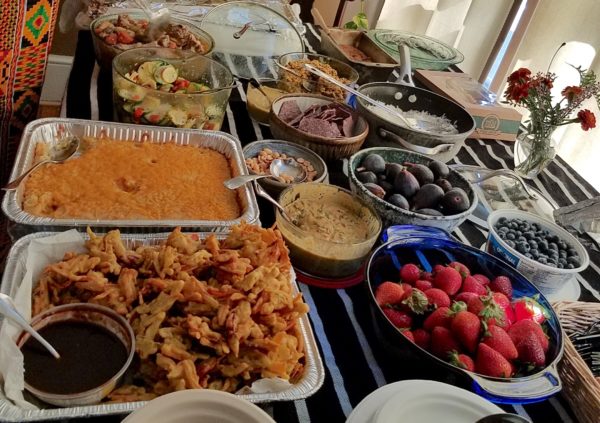
sharing food with friends in Asheville
Home means different things to people. As a concept and definition, it interests me to no end, and some of my most animated conversations, no doubt, have been about the idea or place of home. I have written extensively about it in both my poetry and creative nonfiction, and I continue to delight in discovering authors who share diverse experiences of home.
Homi Bhabha in the Location of Culture mentions the “estranging sense of the relocation of the home and the world—the unhomeliness—that is the condition of extra-territorial and cross-cultural initiations.” I think such cross-cultural initiations sometimes take on the form of parties that bring different groups of people together, or home rearrangements in which folks whose mental outlook has been shaped in environments other than their current ones attempt to re-create former settings in order to feel less estranged. Less unhomely. What results is a fusion that tends to enlarge lives rather than shorten the gap between left homelands and the host spaces or countries. On the other hand, when attempts at the extra-territorial and cross-cultural initiations fail, perhaps because of the way home can be its own trap, or because estrangement remains, the home self might experience a shrinking instead of extension. Bhabha clarifies that “To be unhomed is not to be homeless, nor can the unhomely be easily accommodated in that familiar division of social life into private and public spheres. The unhomely moment creeps up on you stealthily…” perhaps in the same way I feel that the end of September has crept upon me as though I do not possess a calendar.
I was at a friend’s new home and party this weekend when I started to take note of homing patterns in the music, dances and food we were sharing. It occurred to me that we were not creating a new home in that moment. We were repeating the homes we know, the homes we’ve left, the homes we’ve carried, the homing experiences we’ve always practiced even when I’d like to believe that we were still making new experiences and homes simultaneously. I wondered if we were somehow failing our imagination to create entirely new homes, whether ritual and a bit of tradition were in the way, while the cross-cultural initiation was still truly happening. What comforted me, what stopped me from sliding into unhome was the realization that along with other guests and our hosts, we had made conscious decisions to participate in the new setting, to share the food we’ve cooked in the past, dance the moves and play the music we’ve previously known in our old settings because we were in a place of collective sense-making which we kept alive through reenactment, and that, weirdly, was the new and un-estranging.
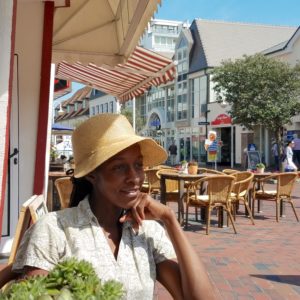
A homely moment in Westerland, Sylt.
Some of the best works I’ve read about homing consider the unhomely experiences as those moments when the self or soul feels separated from itself, others, the divine, or when it gets lonely and wants to escape the lonelineness. When it’s afraid of solitude or silence. Interestingly, separation is only illusional, because we are never far from ourselves. Apparently, we only have to look inward to find ourselves again. To connect with our center. Nor are we ever far from others because most of our friends or loved ones are often a call away, a few minutes away from us, so the immense degree of separation we may feel is half true in a limited reality. This also means that every human goes through unhomeliness since it’s an inner thing, but the experiences might be sharpened by a migrant lens. Therefore, much of our longing for connection with others is more about integrating with ourselves—coming home to ourselves. The disconnection or feeling of fragmentation appears disguised as a need to encounter others.
John O’Donohue in all his work highlights the importance of inner friendship with one’s self: “When you cease to fear your solitude, a new creativity awakens in you. Your forgotten or neglected inner wealth begins to reveal itself. You come home to yourself and learn to rest within.” One of the finest poems about this kind of homing is Love after Love, by Derek Walcott. John Berryman in his tongue-in-cheek Dream Song 14 shows us what happens in the life of a character who has no inner wealth, how he ends up bored mightily even when the mother’s warning kicks in: “Ever to confess you’re bored/ means you have no/ Inner Resources.” Once we become aware and courageous to face the turbulence of our great boredom, restlessness, lonelineness, disconnection, separation and whatever other forms the unhomely might take, our hunger to belong is resolved and we find intimacy with our soul–the coming home experience in which we enter the peace of our wild nature. On this note, I leave you with Wendell Berry, The Peace of Wild Things
When despair for the world grows in me
and I wake in the night at the least sound
in fear of what my life and my children’s lives may be,
I go and lie down where the wood drake
rests in his beauty on the water, and the great heron feeds.
I come into the peace of wild things
who do not tax their lives with forethought
of grief. I come into the presence of still water.
And I feel above me the day-blind stars
waiting with their light. For a time
I rest in the grace of the world, and am free.
The Selected Poems of Wendell Berry, Counterpoint, Berkeley, 1998.
And Mary Oliver’s Wild Geese
You do not have to be good.
You do not have to walk on your knees
for a hundred miles through the desert repenting.
You only have to let the soft animal of your body
love what it loves.
Tell me about despair, yours, and I will tell you mine.
Meanwhile the world goes on.
Meanwhile the sun and the clear pebbles of the rain
are moving across the landscapes,
over the prairies and the deep trees,
the mountains and the rivers.
Meanwhile the wild geese, high in the clean blue air,
are heading home again.
Whoever you are, no matter how lonely,
the world offers itself to your imagination,
calls to you like the wild geese, harsh and exciting –
over and over announcing your place
in the family of things.
Originally published in Dream Work by The Atlantic Monthly Press, New York, 1986.
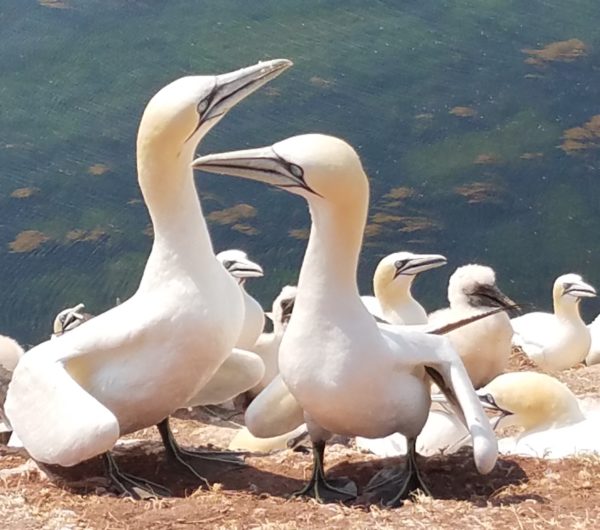
Northern Gannets on Heligoland island in the North Sea.
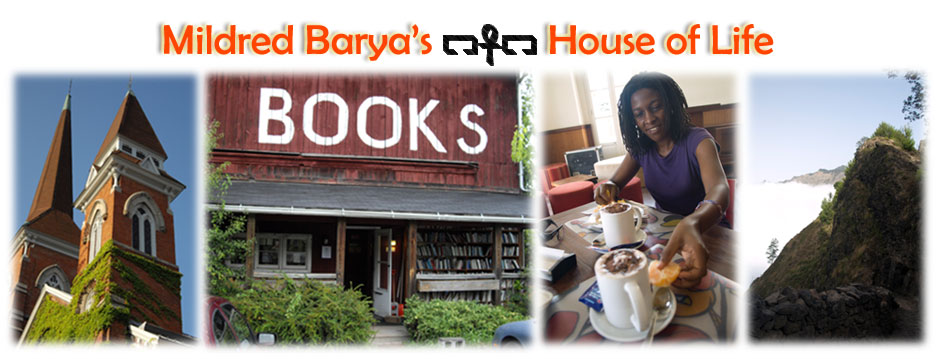



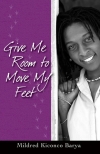

No comments yet.